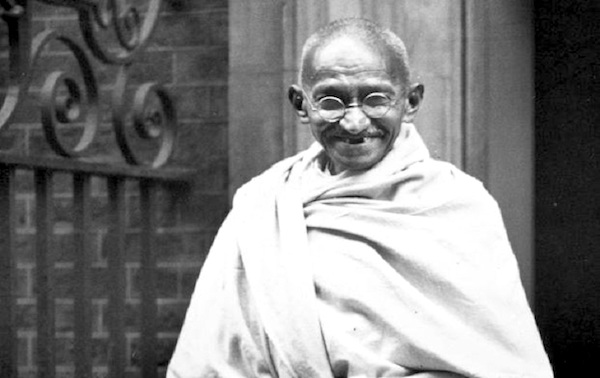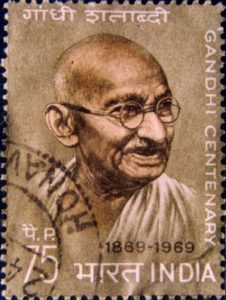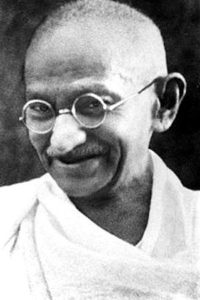
“To deprive a man of his natural liberty and to deny to him the ordinary amenities of life is worse than starving the body; it is starvation of the soul… the dweller in the body.” – Mahatma Gandhi
Mohandas Karamchand Gandhi
In recent years I have watched in dismay as bureaucrats walk a tightrope between nationalism, politics and business as usual. In an attempt to present the nation with please-all policies, they do indeed please millions… who already benefit from an exploitative system. But they will drive the ecosystem people — fisherfolk, forest dwellers, marginal farmers, pastoralists and adivasis — even closer to the edge of despair. “We need more infrastructure” they say while planning the usurpation and destruction of the infrastructure of more than half-a-billion souls — rivers, coastlines, lakes, grasslands, forests and hill sides.
While dreams of building spanking new highways come true, over one million people will be forcibly displaced, their lands acquired under antiquated laws crafted by the British to pillage ordinary Indians. And, having shot their newly-borrowed World Bank wad on new roads, they will be left with nothing to repair and maintain the over one lakh kilometres of state and national highways which are rotting on account of neglect.
 During the many speeches, false promises and hypocrisy of the 50th Independence Day Celebrations, the media, once again, dutifully brought home to us the shenanigans of a ruling class far removed from the reality of ordinary people. Each time I witness such charades I feel a growing sense of disquiet, bordering on shame, at the manner in which one set of Indians consumes the assets, hopes and aspirations of their less powerful compatriots.
During the many speeches, false promises and hypocrisy of the 50th Independence Day Celebrations, the media, once again, dutifully brought home to us the shenanigans of a ruling class far removed from the reality of ordinary people. Each time I witness such charades I feel a growing sense of disquiet, bordering on shame, at the manner in which one set of Indians consumes the assets, hopes and aspirations of their less powerful compatriots.
I was born in 1947 and grew up in an ambience of patriotic fervour. It is with a deep sense of regret, therefore, that I now question the very validity of our holding meaningless celebrations on Independence Day, or Republic Day. Such occasions have become devoid of true meaning. It may seem cynical, but on such occasions it may be more appropriate, if the Indian flag were flown at half mast to mourn for the fact that more than 500 million Indians have yet to taste the fruits of true freedom — freedom from hunger, insecurity, injustice and indignity. In the words of Gandhi, “we have starved their souls.”
 Day after day, despite new scams and convictions hitting the headlines, we continue to be subjected to the sight of politicians of all hues, wearing the uniform of Gandhi even as they abuse his nation-building value systems. Perhaps the words of Gandhi: “In the name of God…go!” should now be addressed to the neo-colonials in our midst. These worthies picked up the tools of colonialism which the British left behind in obeying Gandhi’s terse request. Such tools are even more brutally used against our people today than they were in the hands of the British. Which, perhaps, is why the National Alliance of People’s Movement cry: “Enough is enough, in the name of God… go!” has indeed begun to cleave the air once more. This time by the millions who reside in Dakshin Kannada, Narmada, Tehri, Indravati, Dahanu, Pooyamkutty and Koel Karo. Such communities are joining hands against the inheritors of British power — India’s politicians, planners, big businessmen and bureaucrats. These latter-day colonialists festoon themselves in tricolour images, yet see no irony in regularly and unashamedly using the black Acts crafted by the British — Land Acquisition and Official Secrets — to accomplish their dark deeds, including the displacement of adivasis and the loot of the lands, forests, rivers and ancestral properties of our rural poor. Given such ruthless exploitation, it is little wonder that the seeds of separatism and violence have sprouted through the length and breadth of our once-peaceful land. Indeed, those who fear the dismemberment of India should consider whether our country has not already been split in two — rich India… and poor India. Only self-inflicted myopia prevents us from recognising this tragic reality.
Day after day, despite new scams and convictions hitting the headlines, we continue to be subjected to the sight of politicians of all hues, wearing the uniform of Gandhi even as they abuse his nation-building value systems. Perhaps the words of Gandhi: “In the name of God…go!” should now be addressed to the neo-colonials in our midst. These worthies picked up the tools of colonialism which the British left behind in obeying Gandhi’s terse request. Such tools are even more brutally used against our people today than they were in the hands of the British. Which, perhaps, is why the National Alliance of People’s Movement cry: “Enough is enough, in the name of God… go!” has indeed begun to cleave the air once more. This time by the millions who reside in Dakshin Kannada, Narmada, Tehri, Indravati, Dahanu, Pooyamkutty and Koel Karo. Such communities are joining hands against the inheritors of British power — India’s politicians, planners, big businessmen and bureaucrats. These latter-day colonialists festoon themselves in tricolour images, yet see no irony in regularly and unashamedly using the black Acts crafted by the British — Land Acquisition and Official Secrets — to accomplish their dark deeds, including the displacement of adivasis and the loot of the lands, forests, rivers and ancestral properties of our rural poor. Given such ruthless exploitation, it is little wonder that the seeds of separatism and violence have sprouted through the length and breadth of our once-peaceful land. Indeed, those who fear the dismemberment of India should consider whether our country has not already been split in two — rich India… and poor India. Only self-inflicted myopia prevents us from recognising this tragic reality.
I cannot help but feel that, were he alive today, Gandhiji would have been forced by inner compulsion to launch yet another satyagrah. This time against us, the “haves” of India, because we have outdone the British in our acquisitive quest for `development’. Never in the history of free India have so few people grown so fat at the cost of so many. Even as we delude ourselves with the notion that India is progressing thanks to its industrial and financial policies, we must face up to the fact that our own consumptive lifestyle is actually turning us into predators. When the British left, with unseemly haste we began constructing Nehru’s modern temples. And where did we site our dams, mines, power plants and roads? Deep in the hinterland, from where we began to suck all resources towards urban centres. Predictably, such acts resulted in mass migrations, as people followed their resources to our cities. Here we spurned them. We herded them into slums and hovels in which conditions were worse that those that prevailed in the infamous refugee camps during the dark days of partition. Apart from their resources, we also stole from the proud people of India that one asset so vital to the human spirit — dignity. It is a mystery to me how we have managed to absolve ourselves of responsibility for such crimes. Even now, at conferences, seminars and from the hallowed corridors of Parliament House one hears that calumny: “India could be at par with America, the UK, or Japan, if only we did not have to carry the burden of the teeming millions who drag us down at every step.”
How different things would have been had Gandhiji been alive today. If we had him at the forefront of the human rights and environmental movement he would have travelled from village to Indian village to consult with the people. Instead of dispensing knowledge to them, he would have learned from them their technologies for survival and sustainable development. He would then have prevailed upon the rest of us in urban India to set an example of simple, ecologically sound, living for the benefit of others. After nearly two decades of meandering through the perplexing paths of environmental rethink, I have come to the conclusion that Gandhiji had provided solutions to our current environmental problems even before they had cropped up. He was not merely a man before his time, but also an environmental prophet whose precious life was squandered on a people who, even decades after his death, have failed to recognise his true worth.

Ref:”Gandhiji:The man before his time”:
Yes,It is distressing to note the adverse effects of ‘Development’.
To stem this trend Dr.Kalam actively
promoted ‘Pura’:Urban-Rural-complementary-link.
In this context, although a miniscule,
let me refer to the ‘Chennaihomes for Senior Citizens’ located in the midst of a remote village in Kottaikadu near Pondichery.
Promoted by a Visonary-Lady-Enterprenuer,we-residents have modern facilities in rural environment,supported and sustained by valued services of the rural-folk.
This is an example worth emulating…
Whatrust is more: a co-resident-couple (a retired engineer and retired school-principal) have developed few acres nearby, as a self-sustained model-farm,co-operating with nearby farmers, practising drip irrigation and crop rotation, enhancing agri-productivity, again reversing the trend of rural migration to crowded cities!
/ks Krishnan (92)